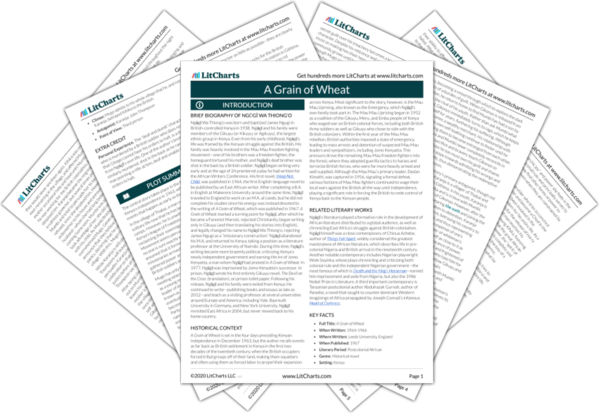Kihika Quotes in A Grain of Wheat
Chapter 7 Quotes
Unknown to those around him, Kihika’s heart hardened towards “these people,” long before he had even encountered a white face. Soldiers came back from the war and told stories of what they had seen in Burma, Egypt, Palestine and India; wasn’t Mahatma Gandhi, the saint, leading the Indian people against the British rule? Kihika fed on these stories: his imagination and daily observation told him the rest; from early on, he had visions of himself, a saint, leading Kenyan people to freedom and power.
“I would hate to see a train run over my mother or father, or brothers. Oh, what would I do?” [Mumbi] quickly exclaimed.
“Women are cowards.” Karanja said half in joke.
“Would you like a train to run over you?” Mumbi retorted angrily. Karanja felt the anger and did not answer.
In Kenya we want deaths which will change things, that is to say, we want true sacrifice. But first we have to be ready to carry the cross. I die for you, you die for me, we become a sacrifice for one another. So I can say that you, Karanja, are Christ. Everybody who takes the Oath of Unity to change things in Kenya is a Christ.
Though Njeri was a short girl, her slim figure made her appear tall. But there was something tough about that slimness. She despised women’s weaknesses, like tears, and whenever fights occurred at Kinenie [forest], she always fought, even with men. A cat, men called her, because few could impose their physical will on her.
Chapter 13 Quotes
“I despise the weak. Why? Because the weak need not remain weak. Listen! Our fathers fought bravely. But do you know the biggest weapon unleashed by the enemy against them? It was not the Maxim gun. It was the division amongst them. Why? Because a people united in faith are stronger than the bomb. They shall not tremble or run away before the sword.”
“But what is an oath? For some people, you need the oath to bind them to the Movement. There are those who’ll keep a secret unless bound by an oath. I know them […] In any case how many took the oath and are now licking the toes of the whiteman? No, you take an oath to confirm a choice already made. The decision to lay or not to lay your life on the line for the people lies in the heart. The oath is water sprinkled on a man’s head at baptism.”
I am important. I must not die. To keep myself alive, healthy, strong—to wait for my mission in life is a duty to myself, to men and women of tomorrow. If Moses had died in the reeds, who would ever have known that he was destined to be a great man?












